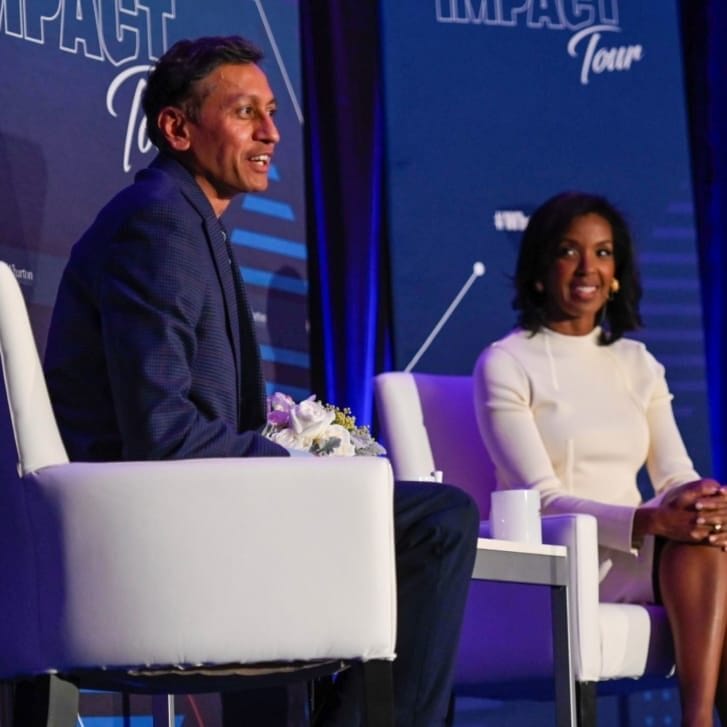How are companies responding to climate change, calls for corporate-board reform, and shifting expectations about their social responsibility? The annual Beyond Business series recently explored the complexities of environmental, social, and governance (ESG) issues through virtual discussions led by Dean Erika James. Developed as an expansion of the School’s Tarnopol Dean’s Lecture Series, three events in the fall brought together panelists from across academia and business who offered thoughts on climate-related investment risk, executive compensation, workplace equity, and much more.
Eye on the Environment
A recent United Nations panel report blamed human influence for rapidly warming the planet at a rate not seen in at least 2,000 years. U.N. Secretary-General António Guterres, who described the report as a “code red for humanity,” called on private and public stakeholders to work toward greener economies. But the path forward isn’t always clear.
“Whether we develop new government policies, work together to create new energy-efficient technology, or commit to reducing emissions through nature-based solutions, more and more people believe something needs to be done. But what is the role business should play in this endeavor?” Dean James asked during the first Beyond Business panel in October, titled “Tackling the Climate Crisis: What Can Companies and Policymakers Do to Drive Impact?”
Sarah Light, a Wharton legal studies and business ethics professor whose research focuses on environmental law, corporate sustainability, and innovation, said businesses are responding to the call for change even as that call grows louder and more insistent. For those that haven’t yet taken action, she said, there are three things they can do right now to start making a difference:
- Measure and manage emissions from their own on-site operations and work to power their operations with renewable energy.
- Look beyond their operations to the environmental footprints created by their partners up and down the supply chain.
- Speak up for climate policy.
“Not all firms have gotten there,” Light said, “and I would encourage them to put their money where their mouth is in terms of advocating for public policies that will support a transition to a net-zero economy by 2050.”
She also urged firms to be more transparent to the public and government regulators about what they’re doing to mitigate emissions. This is especially important because there’s so much uncertainty around the metrics and terminology of going green. A lot of companies are using third-party platforms to disclose their environmental activity in the absence of substantial governmental guidance at this point. But the Securities and Exchange Commission has taken note of these voluntary disclosures and is catching up, she said. The agency in March proposed its own disclosure rule regarding climate risk and impact.
As for the consequences of weather- and climate-related disasters, Wharton real estate and finance professor Benjamin Keys said there were 22 billion-dollar disasters in the U.S. in 2020. As a result, both private and public real estate players are scrambling to come up with solutions. “There’s a recognition in the housing and mortgage space that these growing risks are going to need to be addressed and that the federal government is not going to simply pick up the tab in the ways they have in the past,” he said.
Yet mitigating the risks from climate change is too costly for homeowners to bear alone. It’s going to take collaboration and support from the government and the private sector to make it work, and Keys expects to see progress. “I think we’re just scratching the surface in the housing and mortgage markets in this space,” he said.
As for the investment community’s role in addressing environmental issues, David Swift, chief operating officer of impact investment group Engine No. 1, said companies have a fiduciary responsibility to shareholders to analyze risks related to climate change. Such analysis may include whether companies are adopting greener manufacturing practices or continuing to rely on fossil fuels. “It is absolutely possible to address the needs of shareholders while thinking about climate change,” Swift said. “If you think about it as an economic issue, it poses material risk to your business if you’re on the wrong side of this transformation.”
Transforming the Boardroom
In his seminal 1970 essay, Nobel Prize-winning economist Milton Friedman wrote that companies have no social responsibility beyond making money for shareholders. This doctrine guided generations of business executives, board members, and policymakers who ensured that firms forged ahead in the free market with profits as the sole objective. Perhaps Friedman, who died in 2006, would have been surprised when the Business Roundtable — an association of the country’s top chief executives — released a statement in 2019 that revised the purpose of a corporation, to promoting an “economy that serves all Americans,” including customers, employees, suppliers, and communities.
“It’s amazing how much governance has changed,” Wharton finance professor Luke Taylor said during the November panel “Redefining Corporate Governance: Establishing Essentials for the New Business Era.” “My view is that companies should not be maximizing shareholder value. Instead, they should be maximizing shareholder welfare. There’s a difference there, because shareholders may care about more than just profits.”
Even a cursory look at the makeup of modern boards reveals how significantly they’ve changed. Environmental damage, social and racial injustice, gender inequality, the COVID-19 pandemic, technological disruption, and other pressures are pushing companies to take a broader look at their purpose and mission. They want board members with specific expertise in areas such as impact investing, human resources, auditing and accounting, crisis management, and artificial intelligence, according to the event’s panelists.
“Many boards are not equipped to offer strategic guidance on these kinds of non-market crises that arguably carry the most enterprise risk for firms today,” said Wharton management professor Mary-Hunter McDonnell. “Firms are [adapting] by adjusting the profile of directors that they’re onboarding. This shift is equipping boards to better understand and guide firms through more turbulent social and political environments.”
Consumer attention to ESG issues has also shone a spotlight on executive compensation. The panelists said pay is a hot topic because it’s directly linked to corporate values, at least in the eyes of customers and employees. “It ties back to the conversation of what you are trying to maximize,” said Brian Stafford W98, chief executive officer of governance software provider Diligent Corporation. “Are you trying to maximize the value for your stakeholders, or are you trying to maximize value for your shareholders?”
According to McDonnell, executive pay is skyrocketing based on pay-for-performance, but that doesn’t extend down to rank-and-file employees who also contribute to a company’s success. Research has linked that disparity to harmful outcomes within the company and society at large, including lower morale, reduced collaboration, underinvestment in public goods, and higher crime rates. “It’s useful for boards to understand why pay inequity matters,” she said. “We do need to pay attention to the broader social effects of having pay that is enjoyed by only the people at the very top.”
A More Equal Playing Field
Panelists at the third Beyond Business event in December homed in on the social aspect of ESG.
“The S, or the social factor, is really about people,” said Wharton management professor Witold Henisz. Employees, supply chain partners, customers, and the larger community are all affected by the operations of a firm. “It’s really the salience of these different groups that’s going to drive the allocation of resources at the corporate level,” he said.
Joining Henisz and Dean James for the discussion — titled “Humanizing ESG: Why Diversity, Wage Inequality, and Workers’ Rights Deserve Our Attention” — were John Streur, president and CEO of Calvert Research and Management, and Andrew Plepler, global head of ESG for Bank of America.
In 2020, Bank of America responded to the civil unrest sparked by the police killings of George Floyd and Breonna Taylor by launching a five-year, $1.25 billion initiative to advance racial equality and economic opportunity. “I think for most companies, you’d be pretty tone-deaf if you didn’t absorb what we lived through in 2020 — both through the pandemic and social-injustice issues we confronted,” Plepler said. “These issues are not separate from what we do all day. I think it was an awakening to examine all of that.”
As with other companies across the country, pressure at Bank of America didn’t just come from the outside. Plepler said the events also touched off conversations inside the company from employees who wanted Bank of America to do better. They demanded that the bank close its pay gap and improve its track record on diversity, equity, and inclusion (DEI). As a result, Bank of America raised its minimum wage to $21 an hour, kept health insurance premiums flat for the lowest-paid associates, and increased its diversity hires.
Creating a more equitable workplace isn’t just the right thing to do, Plepler said — it’s the practical thing to do: “When you talk about attracting and retaining the best people, you are not going to do it today if you don’t have a good answer to the question” of how the company treats its workers.
Calvert Research and Management’s Streur made headlines in 2020 when he said that ending racism was the responsibility of corporations. During the Beyond Business event, he said he stands by his remark: “The reason I made the statement is that we think that racism and companies’ ineptitude in terms of dealing with DEI well is destroying value for shareholders.”
His investment firm gathers empirical evidence to build the business case for ESG. He said American demographics are shifting, so it’s imperative for companies to recruit more women and people of color. “We’re coming at it from a perspective of trying to improve value for shareholders while helping companies solve this problem associated with their inability to create this attractive career path and workplace, particularly for mid-career employees,” Streur said.
Henisz is also making the business case for ESG through his research. His studies have linked social factors to risks for mining companies, infrastructure projects, and municipal finance. “Throughout the body of my work, I’ve been finding ways of bringing data to bear to help make this business case and convince people that ESG isn’t about ideology. It’s about economics,” he said.
Henisz believes that employee treatment will become a paramount issue as the COVID-19 pandemic subsides. The pandemic exacerbated inequalities in health and safety for workers. Those same workers are now ready to walk away from employers who haven’t been protecting and supporting them through one of the toughest times in recent history. “COVID has magnified a lot of stress felt by employees,” Henisz said. “I think workers are going to remember how they were treated by their employer in a time of crisis.”
Published as “Corporate Evolution” in the Spring/Summer 2022 issue of Wharton Magazine.


























